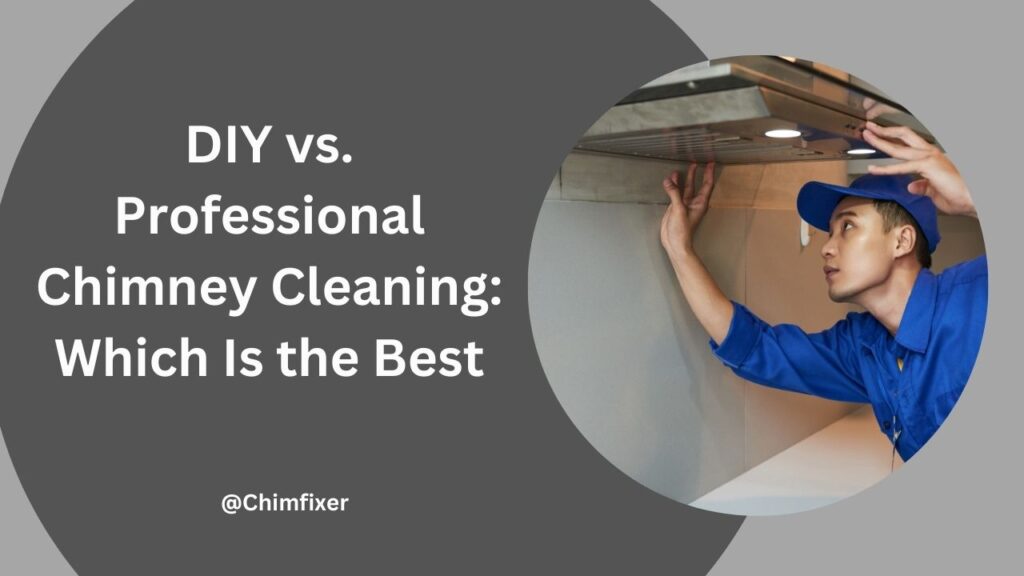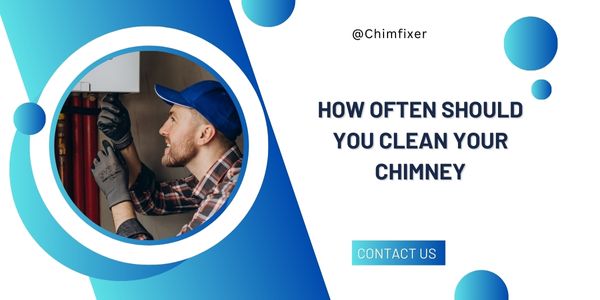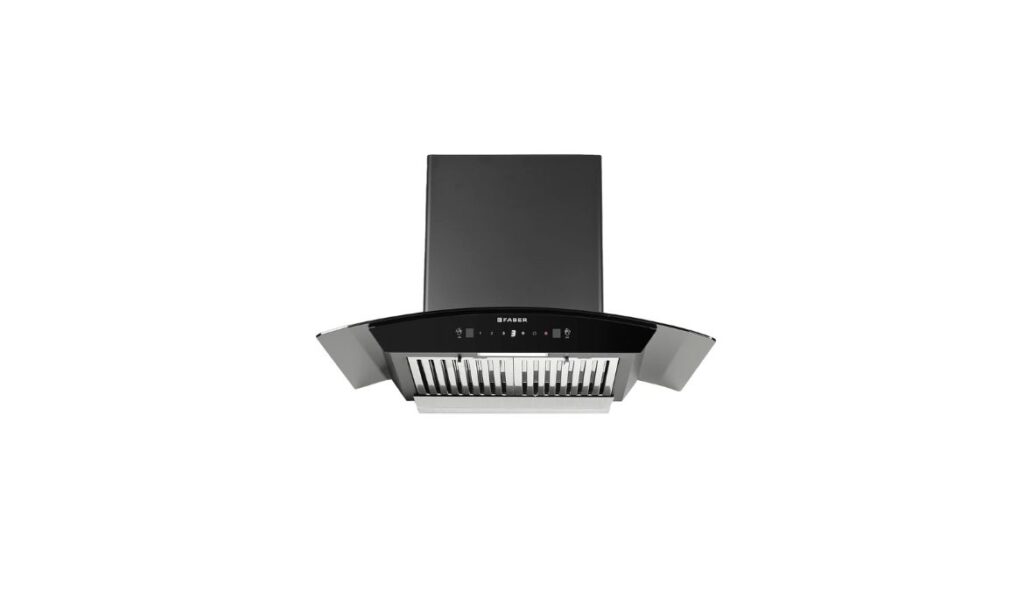DIY vs. Professional Chimney Cleaning: Which Is the Best?
The safety of your residence, together with optimal operational efficiency, depends on proper chimney upkeep. The removal of soot, together with creosote and debris from your chimney, must be your main priority whether you want winter readiness or continuous cleanliness throughout the year. The decision between performing chimney cleaning by yourself or bringing in a professional remains unclear. Each option has advantages and disadvantages.
The guide compares professional chimney cleaning and DIY chimney cleaning services and provides guidelines for determining the most suitable option between expenses, protection, performance, and practical ease.

Understanding Chimney Cleaning
Regular chimney cleaning services enable the removal of soot along with creosote, and any obstructions that create ventilation problems and increase smoke accumulation, and possibly cause chimney fires. Making regular maintenance checks protects both the operational efficiency and the safety of your fireplace or stove.
The chemical compound known as creosote emerges as a wood-burning byproduct that becomes highly combustible through time. A chimney fire becomes more likely when creosote remains in the chimney without being cleaned. Blocked pathways from leaves together with bird nests and other kinds of obstructions restrict proper airflow, leading to ventilation problems. Using a high-quality ventilation system like the Faber T-Shape Kitchen Chimney can significantly help maintain cleaner air pathways and reduce the risk of buildup and blockages. Faber’s sleek wall-mounted chimney featuring powerful 1500 m³/hr suction, filter less Auto Clean tech, and gesture controls—all in a stunning matt black finish.
Why Chimney Cleaning is Necessary?
- Chimney fires can be avoided because creosote buildup constitutes the major cause of such fires.
- The heating performance increases when chimneys stay clean since they enable better ventilation flow, which results in improved efficiency.
- The lifespan of chimneys receives extension through session-based care preventions.
- The quality of indoor air receives improvement because soot, along with blockages and carbon monoxide gases to penetrate the home.
How Often Should You Clean Your Chimney?
A yearly inspection with a cleaning service for chimneys remains the recommendation of the National Fire Protection Association (NFPA). However, frequency depends on usage. Wood-burning fireplaces require more cleaning outings than both electric and gas fireplace models.
DIY Chimney Cleaning
Persons who enjoy working independently can choose to clean their chimneys themselves. The implementation of chimney cleaning demands specific equipment, together with protective elements and a basic understanding of chimney frameworks.
Tools Needed for DIY Chimney Cleaning
- One must use a chimney brush that corresponds to the chimney size.
- Extension rods
- Protective gear (goggles, gloves, dust mask)
- Drop cloths to protect flooring
Flashlight for inspection - Vacuum or broom for cleanup

Steps for DIY Chimney Cleaning
- Begin by covering all available furniture along with floor surfaces to stop the spread of soot and dust.
- Control the chimney brush by extending its rods when you clean the internal part of the chimney by moving downward from top to bottom.
- Vacuum and broom operations will extract loose soot and debris.
- The chimney cap and flue need inspection to verify they remain free of bird nests along with leaves, and all types of blockages.
- Proper disposal methods should be used to get rid of the collected soot and debris.
Pros of DIY Chimney Cleaning
- Cost-effective – No labor costs, only the expense of equipment.
- Convenience – People can perform the task according to their personal scheduling needs.
- Sense of Accomplishment – Most homeowners appreciate carrying out maintenance tasks by themselves.
Cons of DIY Chimney Cleaning
- Safety Risks – Roof climbing and soot handling pose dangers
- Limited Effectiveness – The cleaning process struggles to adequately clean hard-to-reach chimney areas
- Time-Consuming – The complete process takes time because proper execution and cleanup need attention.
Professional Chimney Cleaning
You should hire an expert chimney sweep to conduct complete cleaning procedures and examination services.
What to Expect from Professional Chimney Cleaning?
- Inspection – Specialists evaluate the chimney structure while inspecting it for creosote accumulation and damage, including blocked areas or fractures in the chimney.
- Advanced Cleaning Tools – Specialized cleaning tools such as vacuum systems and brushes with cameras provide total chimney cleaning abilities.
- Removal of Creosote and Debris – The chimney service professionals remove all flammable materials along with debris from the system.
- Assessment of Structural Integrity – Defective areas within the structure get evaluated by professionals to determine whether repairs are needed.
- Efficiency and Cleanup – The professional chimney cleaning process operates faster through reduced dirtiness.
Pros of Professional Chimney Cleaning
- Thorough Cleaning – Specialized equipment operates at professional hands to accomplish thorough activities.
- Expert Inspection – Additional expertise detects potential hazards, including both blockages and cracks.
- Expert Inspection – The procedure is finished efficiently and the homeowners do not need to contribute any manual work.
Cons of Professional Chimney Cleaning
- Higher Cost – Professional services require payment for expertise along with professional labor spending.
- Scheduling Required – A previous appointment is mandatory to book professional cleaning service.
- Dependence on External Services – Users need to depend on available external service providers and their skill levels.
DIY vs. Professional Chimney Cleaning: A Comparison
|
Aspect |
DIY Chimney Cleaning |
Professional Chimney Cleaning |
|
Cost |
Lower (initial equipment investment) |
Higher (service fee) |
|
Safety |
Risk of falls and soot exposure |
No direct homeowner risk |
|
Effectiveness |
May miss hidden buildup or damage |
Thorough and professional-grade cleaning |
|
Time Required |
Time-consuming |
Faster process |
|
Inspection Quality |
No professional assessment |
Trained evaluation of structural integrity |
Which Option is Best?
The selection of chimney maintenance approach relies on what people prefer as well as their skills and budget constraints.
- Homeowners who self-clean their chimney should possess the required experience and tools and feel prepared for safe chimney maintenance.
- Professional chimney cleaning should be selected whenever safety needs to be combined with efficiency and complete effectiveness. Regular professional inspections will uncover damage indicators at an early stage.
Certain situations call for an approach that combines DIY cleaning with professional cleaning. Between professional cleaning, homeowners should carry out minor maintenance tasks to maintain the chimney’s good condition.
Final Thoughts
The practice of both DIY cleaning and professional chimney cleaning shows specific benefits together with certain constraints. The cheaper DIY options present serious risks for users and do not provide the same amount of thoroughness. The performance of professional chimney cleaning service delivers enhanced security alongside improved operational effectiveness and detailed inspection capabilities.
The best approach to chimney maintenance involves performing housekeeper-level maintenance consistently alongside scheduled expert inspections. A properly maintained chimney functions as necessary for homeowners because it benefits safety levels while improving heating performance and indoor air cleanliness.
Frequently Asked Questions (FAQ)
Your chimney needs cleaning when you detect four symptoms: intense buildup of soot, weak fireplace draft, smoke leakage through the chimney or robust burning odors.
Cleaning from the fireplace opening with flexible brushes is possible yet reaching the upper parts of the chimney ensures the most comprehensive result.
Poor chimney maintenance leads to the accumulation of creosote which both raises fire hazards and diminishes performance and creates ventilation complications.
Professional chimney cleaning services in different locations with various degrees of chimney condition generally run between Rs 899 and Rs1499.
The accumulation of dust together with debris and minimal amounts of soot affects efficiency and safety levels in gas fireplaces.
Standard household cleaning products hold no effectiveness in removing creosote or soot from surfaces. Professional chimney brushes should be used together with specific cleaning solutions.
Chimney cleaning logs decrease the accumulation of light creosote yet they cannot substitute for either professional or manual complete inspections.
Property airflow maintenance and seasoned wood selection combined with regular inspections minimize creosote accumulation.

